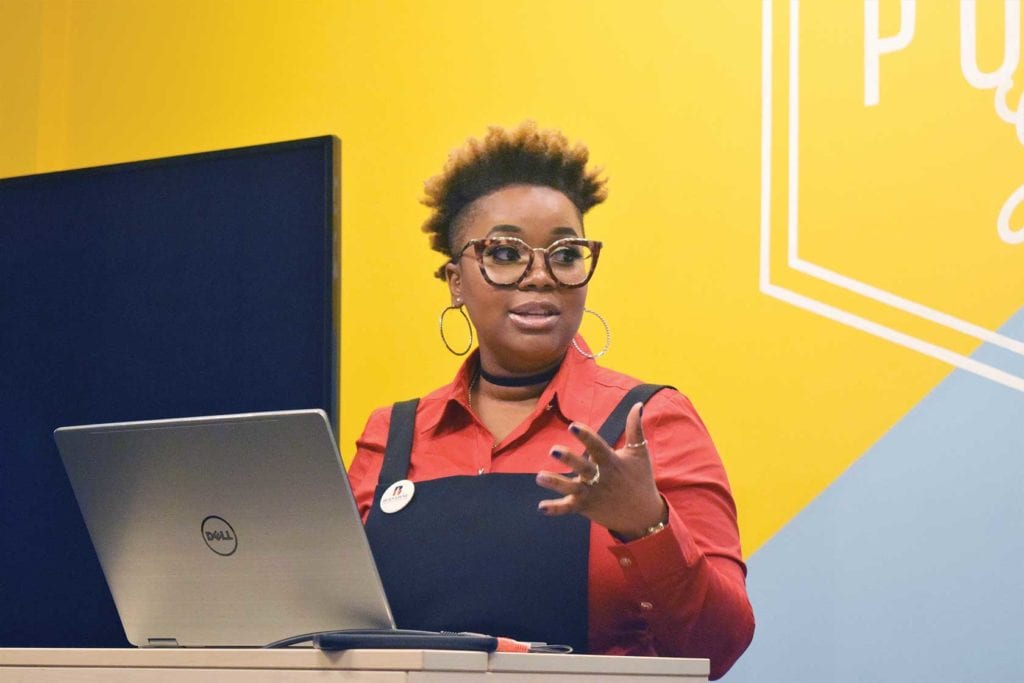
“There’s not a lot of public voice in public media,” said Erika Dilday, executive director of Futuro Media, at the launch of the inaugural edition of the Community Podcast Lab in Boston before Christmas.
In partnership with MassCreative and WBUR, and housed at the PRX Podcast Garage in Allston, Futuro Media worked with six Boston residents over the course of 15 weeks to create multimedia journalism pieces that gives a critical voice to the diversity of their experiences.
“Usually when neighborhoods are covered by outlets, there are news crews dropping in and then leaving,” said Dilday, who is from Dorchester and currently lives in New York. “But with these podcasts, the people within the neighborhoods can decide what is covered and how its covered.”
“I don’t think there’s a lot of intentional effort to bring in underrepresented voices into a bigger media conversation,” said Julio Ricardo Varela, digital director of Futuro Media.
“Podcasting is a very accessible way to tell your story. You don’t have to depend on someone else to let you tell it,” said Varela. “I equate it to the early days of blogging.”
Varela is the co-host of political podcast In the Thick and regularly contributes to Latino USA, NPR’s only English-language national Latino news program.
Dilday is a longform documentarian and previously served as executive director of Maysles Documentary Center in Harlem, New York.
“It’s really important to take our expertise and literally bring it out into the community,” said Varela.
The Community Podcast Lab participants are all women, range in age from 23 to 70 and include two immigrants and two first-generation college graduates.
According to Dilday, recruitment of applicants to the Community Podcast Lab was a grassroots effort. Dilday and other staff members reached out to individuals in person at places such as Boston’s Caribbean Carnival and the Puerto Rican Parade.
“What excited me the most about this group was that they wanted to tell their stories for the good of others,” said Dilday.
The program directors reviewed over 80 applications and selected a total of six up and coming storytellers of color to participate.
At the inaugural ceremony at the PRX Podcast Garage in Allston, each podcaster introduced themselves, the topics they have been covering and provided a preview of their audio pieces
The storytellers
Vilma Uribe, who is a self-described survivor of violence, explored the love stories of queer and transgender people, especially those who have migrated from Latin America to the United States. Uribe said that with her podcast, she learned a lot about how to piece together a cohesive story and share subjects’ experiences without objectifying them.
In her radio story, Imani William focused on African-American Muslims in Boston, including her family members who have deep ties to Malcolm X’s Roxbury Nation of Islam in the 1960’s. She includes first-hand interviews with members of that community. William said of the radio storytelling process, “I loved messing with sound and seeing how it can elevate the story.”
Paula Elliott is a retired third generation black educator from the Boston Public Schools system. Her podcast tells the story of teachers, students and parents of the West Roxbury Education Complex and their efforts to stop the closure of their school. Elliott said the proposed closure of the school is a result of “gentrification and part of the master narrative of the city” from decades of institutional racism.
Bernadine Desanges is a Haitian-American, Mattapan native and survivor of sexual assault. Her podcast explores the political climate surrounding sexual assault, including the perspectives of men, both allies and non-allies of sexual assault survivors.
In her story, Desanges interviews a man she believed to be an ally but throughout the conversation finds that he is skeptical of sexual assault survivors speaking out. The unnamed man is heard saying, “Why talk about it 15, 20 years later? What is the point of that? You just look like a crazy person.”
“Although I didn’t agree with him, it is still a story,” said Desanges. “I wanted to know where that perspective comes from.”
Maria Cristina Del Valle shared her story growing up in the Salem Public School system with dyslexia and not being able to “learn Spanish because my school did not recognize my dyslexia.”
In her podcast, Del Valle interviews her mother, who recalls how her daughter’s severe dyslexia was pushed under the rug for years by educators. Trusting the opinion of an American authority figure, Del Valle’s mother admits that she did not speak Spanish to her daughter growing up, believing it would help her focus on improving her English reading and writing skills. But in her interview, she admits she is not completely sure that that was the right thing for her to do.
The last podcaster, Kimberly Rodriguez, who was not present at the inaugural podcast lab event, but according to a Futuro Media press statement, Rodriguez’s podcast focuses on her experience being the daughter of first generation immigrants who do not fit the “good immigrant” narrative. Her story is an effort to humanize individuals who have committed crimes.
All six podcasts will be distributed locally and nationally in their final versions early in the new year.
The Futuro Media Group is an independent nonprofit organization, based in Harlem, New York and dedicated to producing ethical multimedia journalism from the perspective of people of color. It was founded in 2010 by Maria Hinojosa, award-winning Latina journalist.






